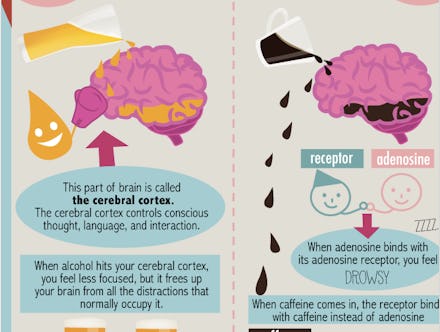Science Explains What Happens to Your Brain on Beer vs. Coffee

Which drug should you drink and when?
That's the problem this helpful image from Daily Infographic seeks to resolve, advising erstwhile college students on the differences between beer and coffee. See below:
In a nutshell, beer is better for helping you come up with ideas, while coffee is better at helping you execute on those concepts. This video explains the science behind drinking beer more accurately:
As PolicyMic's Brooke Horton wrote, "The increase in inhibitory signals makes it so you focus on things that seem important to you. Essentially, you're thinking very little, but very deeply ... well ... kind of deeply." Which is why small amounts of alcohol — like a snifter of brandy after dinner, or a single mimosa at brunch — could help with creativity, but a larger amount will turn you into a drunken frat boy. And considering that one of alcohol's effects is making you want to consume more of it, those with poor self-control would be advised to disregard Daily Infographic's advice to partake to improve their creative talents.
Coffee, on the other hand, is just lovely. And while it might not be as good a way to partake of caffeine compared to tea, which has anti-oxidants, helps slow aging, and is just generally healthier, coffee-drinking is associated with longer lifespans and like any other caffeine-laden substance can help get you through a rough afternoon. But not all coffee is made equally. Getting a larger portion or adding milk, syrup, sugar or whipped cream can turn your cup of joe into a health-destroying mix of fat and glucose. And it probably dilutes caffeine's beneficial effects on your concentration. So order that coffee black for the healthiest, strongest effect.